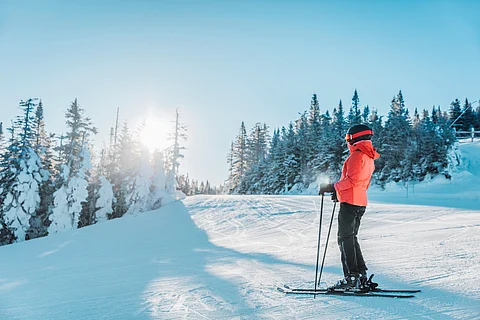
- Destinations
- Experiences
- Stay
- What's new
- Editor’s Picks
- Responsible Tourism
- CampaignsCampaigns
- Subscribe

Skiing is a sport that can be challenging to master but provides endless joy. As a beginner, it is crucial to remember the long list of dos and don'ts that come with the sport. Like any other sport, skiing also has terms, such as "carving" for making precise turns and "powder" for fresh, soft snow, which are important to understand. The thrill of skiing down a snow-covered slope, the crisp mountain air, and the stunning scenery add to the overall experience. Proper techniques for controlling speed, turning gracefully, and mastering the use of ski poles are equally important.
Although skiing can be a highly rewarding activity, it also comes with risks, such as collisions, gear malfunctions, and internal injuries, all of which can lead to accidents. Therefore, we have compiled a list of mistakes that every skiing beginner should be mindful to avoid for a good start and an enjoyable learning process.
It's common for first-time skiers to overlook the importance of properly preparing their gear. It's crucial to ensure that your ski equipment, including your skis, boots, and poles, are the right size and well-maintained. Taking the time to fit your gear properly can prevent discomfort, blisters, and injuries.
Your helmet is the most critical piece of equipment when skiing, as it will protect you from serious injuries. Before hitting the slopes, properly set up your ski bindings for safety and comfort. The bindings hold your boots in place and release them to prevent injury in the event of a crash. Boots are also crucial, and finding the right size and fit for you is essential. Don't rush to the slopes without properly fitting your gear. Your ski poles should also be chosen based on the grip of your gloves. They act as stilts to help you balance and keep you from falling. Additionally, goggles are equally important to include in your list of gears. Some goggles come with two lenses, so you can shift between the darker lens on sunny days and the lighter one when it's cloudy. Finally, choose a jacket that will allow you to glide and cut through the wind without being too heavy and restricting your mobility.
Some beginners tend to undervalue the significance of taking professional ski lessons. While learning from acquaintances or relatives may seem appealing, certified ski instructors offer valuable guidance on proper technique and safety measures that you might not find elsewhere. Investing in ski lessons to enhance your learning curve and augment your overall skiing experience is wise. It is also equally important to get on board with the specific details and warnings locally known at the site you've chosen for the skiing.
Certain ski resorts sell lift tickets and ski lessons only in advance, which means that you might not be able to get them on the day of the sport. However, even if that's not the case, sorting out lift tickets and booking ski lessons before you arrive is usually less expensive. If you plan to stay in town for a long weekend, inquire about the resort's multi day passes, lessons, and lift ticket packages.
Skiing can be quite demanding on the body, and it's important to be in good physical condition to enjoy the slopes without getting overly tired. To enhance your endurance and reduce the risk of injuries, it's recommended to prioritise exercises focusing on cardiovascular health and strengthening your legs in the weeks leading up to your ski trip. A complete body checkup before you hit the slopes is also advisable, as it would eliminate all possibilities of bodily harm.
In the excitement of the inviting slopes, many adventurers simply forget to consider the weather. Monitor the weather forecast, snow conditions, and trail statuses to ensure a safer and more enjoyable skiing experience. The weather tends to be moody sometimes, which will mean making slight customisations in your gear and clothing.
The skiing slopes also look easy and feel like a breezy affair. Many enthusiasts fall into the lure and choose an ambitious slope to ski upon. Choose ski slopes that match your skill level. Start with green circle trails if you're a beginner. Avoid advanced slopes until you're ready to prevent accidents and frustration.
Hydration is the key. Many skiers forget to drink enough water in the rush of the sport, and high altitudes, cold temperatures, and physical exertion can cause dehydration when skiing. Stay hydrated, limiting alcohol and caffeine consumption.
Initial success also boosts the ego, which makes skiers go on for unaccounted hours. It is essential to take breaks to avoid fatigue and enjoy the scenery. Altitude sickness can occur, so acclimate on your first day and seek medical attention if symptoms persist. Bring snacks for safety and financial reasons.
